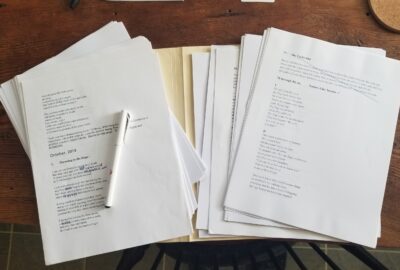 I’ve been writing poetry for 6 years and have just completed a preliminary draft of poems for my 5th collection, a two year process of daily writing and revision.
I’ve been writing poetry for 6 years and have just completed a preliminary draft of poems for my 5th collection, a two year process of daily writing and revision.
I’ve written that first sentence only to set up this sentence: I wish I had written poetry before I had ever taught it. Writing poetry over these last 6 years has given me insights into how poetry comes into existence, and for me, how it therefore acquires meaning.
I was trained in literary analysis through the New Criticism which essentially taught me to see the poem (or novel, play, movie) in and of itself, as a creation to be examined separate from its creator, in most respects. One looked at its syntax, allusions, word choices, symbolic structures, speaker, title, mood, tone. One thought in terms of the evidence of the text and constructed the meaning of the poem based on conclusions drawn from that evidence. “Think like a lawyer,” I told my students. “Create an argument,” I said — these are the facts and therefore this is likely to be true.
I spoke of the emotional core of poems but not nearly enough, and I missed this point entirely, that writing poems (and perhaps the making of all creative endeavors) is an entirely organic process. It comes out of the depths of personal history that its creator can never fully plumb or explain. It is never an answer to anything but always an exploration, a reconnaissance of patterns that keep reappearing in the writing and therefore in the writer’s life. Like all explorations, it is an attempt to discover an unknown, one that even when glimpsed retains its mystery. Even spending time on its shores and meeting its people and seeing its flora and fauna only fills in the edges of the mystery and raises more questions. For example, I know I write often about dogs, birds, political power, the origins and effects of evil, the real wonder of ordinary human beings, my love of light and space, my mother and father, and about how the past works upon us in the present. But I cannot tell you why those have become my subjects. I never set out a plan. They arise from who I am — from my genetic makeup, from myriad encounters and accidents of timing and place, from revelations, from obsessions, from curiosity.
For example, the meaning of a poem may shift with my decision to choose this word rather than another because this word is better for the rhythm of the line when I read it aloud, because I like the rhythm, not because I have some deeper point I’m trying to drive home. I do not write poems to teach or to create puzzles. I write poems because I want to unravel something I saw or felt or remember or do not understand. I write poems because they give me the form to try to understand something ineffable. I work to compress my language to images, not ideas, because that’s what my poems demand of me. Ideas are for essays. Images are the patched up heart of poems.
Poetry forces me to go inside some vision I have in my head and describe it so someone else reading it may see what I saw, but I can no more predict what that reader should think or will think about it than I can predict the destination of the bird I see pass by my window as I am writing this.
Writing my own poems also tells me about talent, one more mystery. I have a scintilla of talent, maybe. Most of the time I just think I have a decent ear for subliminal theft and imitation. But after writing poems, now I can now see how real talent just ‘is’, a fact of nature, a glory that a few possess and the masses do not. Seamus Heaney, Elizabeth Bishop, Robert Hayden, Ada Limon — they have talent, this genius to see more deeply and describe more precisely the vision their histories have given them.
Here’s the other thing poetry has taught me, and this may be the most important. I cannot not write. I like both the discoveries it invites and the play of it, the fitting together of phrases and clauses, not like a puzzle but more like a mosaic that gradually reveals its form and colors. I like the way it takes me out of myself into those visions I mentioned, as if, for a time, I am released into another kind of consciousness, one able to fly away but also fly into, fly above and also perch in the next room alert, listening, spinning the vision this way and that. Writing exhilarates me.
I’ll spend the next few months further revising, choosing, arranging, tossing all of it and beginning again until the final, flawed book emerges and I send it out to a few friends. Meanwhile, I will have begun writing new poems for book #6. There is no end to it until the end and that’s fine with me.